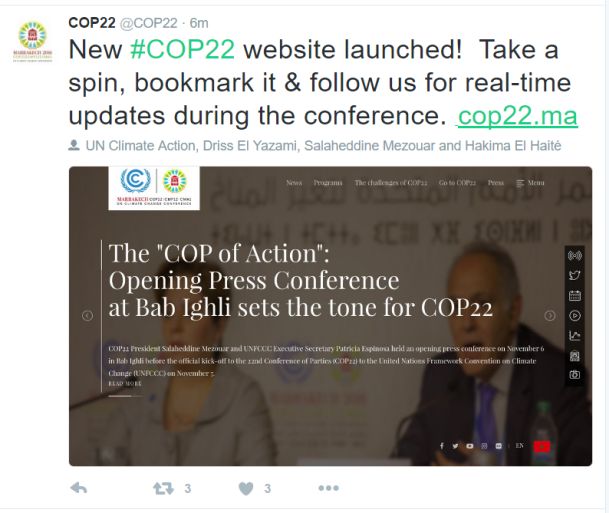On the evening of 6 November 2016, the day before the opening of the climate talks in Marrakech, the official website COP22.ma is relaunched. False map is gone.
The Moroccan hosts of the COP22 climate talks in Marrakech has just announced on Twitter that it has relaunched its COP22.ma website. WSRW on 2 November mentioned in a report how the previous page contained a map in which Morocco had doubled its size as compared to official UN maps.
Morocco has illegally occupied Western Sahara since 1975, a territorial claim not recognised by the international community nor the UN.
With the largely revised site, the erroneous map is now removed. The URL to the previously published map is inactive.
Instead, a piece of country information has been published on the new site under the article "Useful information about Morocco" [or download].
There, the description of the surface area of Morocco is nearly doubled as compared to UN data. It is also claimed that Morocco borders Mauritania, which is not the case. The coastline is referred to as near identical to the circumference of the earth:
"Surface Area: 710,850 sq. km
3,5000 km of coastline
[...]
Bordering Countries: Algeria to the east and Mauritania to the south"
On the new site, it appears furthermore that Morocco is organising an event organised by something it calls "Coalition Régionale pour l'Economie Verte-Region Laayoune Sakhia El Hamra", while an exhibitor is called "Féderation des Amicales et Associations des Quartier de Laayoune".

Morocco allocates land in occupied Western Sahara to green hydrogen investors
Morocco’s ambitions to become a global green hydrogen powerhouse are accelerating. Yet, Rabat is allocating land in a territory it does not legally own.
US eyes minerals in occupied Western Sahara
Seeking to position itself as a key supplier of strategic minerals for Western powers, Morocco has signed a new agreement with the United States that covers Western Sahara’s waters and the critical minerals harboured there.
TAQA-Moeve obtains land in occupied Western Sahara
Morocco’s push for green hydrogen has taken a decisive step forward - on territory it does not legally own.
EU-Morocco Statement: autonomy without self-determination, law without lawfulness
A joint statement that came out of last week’s EU-Morocco Association Council asks readers to believe in a fiction: that an undefined autonomy plan imposed by an occupying power can satisfy the right to self-determination, and that respect for international law can coexist with the systematic ignoring of the EU’s own highest court.



